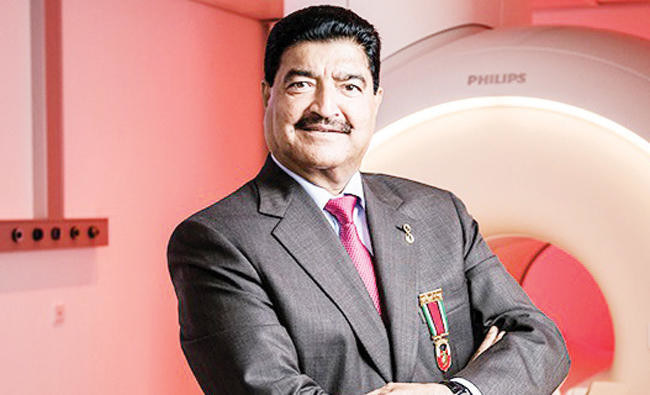NMC and Finablr up to their necks in muddy waters

https://arab.news/6ffp8
The meltdown of NMC Health continues apace. Shares in the Abu Dhabi-based medical group, the leader in the regional health business, which is listed on the London Stock Exchange (LSE), have lost 70 percent of their value since the middle of December. That represents £4 billion ($5.19 billion) of value lost for shareholders in less than two months.
The significance goes far beyond the world of finance. Founded in the 1970s by Indian entrepreneur B. R. Shetty, NMC holds a hallowed place in the UAE corporate structure.
It was one of the first medical businesses to bring quality health care to citizens and residents in the UAE’s private sector. It is the closest the country has come to having a national health service along Western lines.
NMC also became a standard-bearer for UAE business on the global stage. In 2012 it listed its shares on the LSE and saw them soar by 20 times in value. In summer 2018, NMC shares were trading at more than £4,000 each; today they change hands at around £800.
But the seeds of NMC’s current crisis — not too strong a word — go back further than the London IPO (initial public offering). During the financial crisis, NMC found itself in urgent need of funds. Given its central role in UAE life, it quickly found backers, with good links to the Abu Dhabi establishment, who injected liquidity in exchange for equity.
Saeed Al-Qebaisi and Khaleefa Al-Muhairi, Emirati entrepreneurs par excellence, along with Shetty himself, were the main beneficiaries of the booming share price, but they now find themselves the victims of huge value destruction.
Last December, Muddy Waters, a San Francisco-based investment firm with a reputation for hard-hitting analysis and market intervention, struck with a vengeance. Led by the combative Carson Block, the firm makes money by identifying what it regards as over-valued companies and “shorting” their shares.
Short selling is stock market practice whereby an investor agrees to sell shares at a certain price in the expectation that it will be able to buy them back at a lower price in the future. Common in Western markets, it was only allowed in the UAE and Saudi Arabia relatively recently.
Muddy Waters announced it was placing NMC on its shortlist after it identified serious defects at the company that had gone unnoticed in the preparation for the London IPO and in the subsequent boom years. Asset valuations, levels of debt, executive remuneration and agreements with counterparts were all called into question.
NMC denied the allegations and appointed a former director of the FBI, Louis Freeh, to examine them, but the important point is that investors took them seriously and dumped the shares.
Now, as we await the verdict from Freeh, NMC is in a spiral of financial decline that threatens to undermine its very successful medical operations. London regulators are taking an increasing interest in the situation.
To add to the main NMC shareholders’ problems, another company in which they are invested, the financial services group Finablr, has also been savaged by the stock markets, despite the fact Muddy Waters has directly not targeted it at all.
Much like NMC, the core of the Finablr business is an important customer-interfacing operation, via the foreign exchange and remittance counters branded UAExchange. Similar to hospitals and clinics, such services are crucial in an economy like the UAE, dependent as it is on foreign labor.
The resonance of the NMC/Finablr debacles could be felt outside the UAE. NMC expanded aggressively in many global health markets in the good times, including the joint venture in Saudi Arabia with Hassana, part of the Kingdom’s General Organization for Social Insurance, announced last year.
There is no suggestion of any difficulties at that joint venture, nor has it attracted the public attention of Muddy Waters. But the Saudi partners in the deal have the right, even the duty, to question whether its UAE-based allies will remain as focused on the new venture in light of their problems at home.
What happens next at NMC and Finablr is crucial. There is talk of an intervention by the UAE authorities, which would not be unjustified given the central role both play in the country’s life. There is also speculation that Shetty and the other investors will sell the businesses to others with deeper pockets.
Much depends on the next move by Muddy Waters.
• Frank Kane is an award-winning business journalist based in Dubai.
Twitter: @frankkanedubai









































